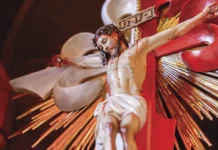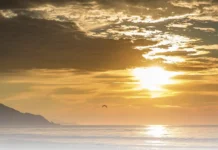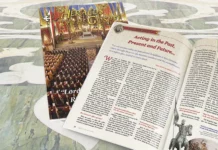The past offers examples of the disasters met by those who preferred to rely on their own strength rather than the help of a good general. Let us take a look at one of them, which occurred during the period of the great navigations.
It is indisputable that the discovery of the Americas deeply marked the history of humanity. Although the desired goal when the great voyages began was different from what was in fact achieved – the original goal was to cross the Atlantic Ocean to reach the Indies – this undertaking still unfolded as a feat of daring, considering the rudimentary resources of the time.
Such a challenge could only have been undertaken with the participation of brave and fearless men, willing to give themselves entirely for an ideal, even at the cost of their lives. In a word, those expeditions required heroes. However, they would never have been successful without the presence of another factor: cohesion, a mysterious force capable of transforming disparate elements into a compact and indestructible body, provided they are engaged in the fight for a higher value.
In this sense, the history of the navigations narrates countless episodes of the triumph and glory of troops that achieved success because they recognized the need to have a leader who would unite them around an ideal and guide them.
However, the past also offers the contrary example: the disasters met by those who preferred to rely on their own strength rather than trust in victory following the orders of a general. We can benefit from considering these events, as well, in order to avoid the “shipwreck” of our vessel. Let us consider one of them, which happened a few years after the arrival of the discoverers in the Americas.
The crew of Don Alonso de Ojeda
Don Alonso de Ojeda, a military captain from Spain, a veteran of the Granada War, who had arrived in the Americas on Christopher Columbus’ second voyage, was leading a group of his countrymen on the newly discovered continent. “A temperate man, audacious, tough, of small stature, but great in courage and intelligence.”1

In 1510, the brave captain landed with his warriors on a Caribbean beach, which was then called San Sebastian. They established a fort there, but soon found themselves beset by constant attacks from the natives, whose poisoned arrows could penetrate any armour, and by a scarcity of food. While they were trying to survive on the meagre fruits of the land, one of the lookouts spotted the arrival of a ship on the horizon.
There was general outbreak of enthusiasm. Ojeda explained to his men the plan that he himself would depart on that ship, in order to bring reinforcements and provisions. The soldiers did not hesitate to accept the captain’s proposal, for they had total confidence in his bravery and great skill.
However, it was also necessary to safeguard the new fort. The troops were to stay in San Sebastian, under the command of a tough and rather uneducated, but adventurous and enterprising war veteran by the name of Francisco Pizarro – the future conquistador of Peru. If the captain did not return in fifty days, they were to leave the settlement.
What must have been the astonishment of the hopeful Ojeda when, shortly after setting out on his voyage, he learned that the sailors on that ship were none other than the first pirates of the New World, under the command of a certain Bernardino de Talavera.2
Navigating the Caribbean seas
Don Alonso de Ojeda did not lose heart. Taking advantage of his status as an experienced and knowledgeable officer of those seas, he immediately declared himself the sole commander of the ship. The bandits accepted at first, but after a few days of voyage in the immense desert of the American waters, being far from the fort and seeing the ease with which he manoeuvred the vessel, they thought they could do the same. They then decided to usurp the command and bind the unfortunate Spanish captain in chains, in the ship’s brig.
Now, after four days of mutiny, the sailors – who knew nothing of the Caribbean seas – were scarcely able to navigate, especially when a terrible storm took them by surprise. Not knowing what to do at that tragic moment, they lowered all the sails, leaving themselves at the mercy of the storm; the ship was soon showing signs of damage… The situation inevitably led to the release of Ojeda, since he was the only one capable of saving the crew.
Having spent four nights in the darkness of the ship’s hold, the captain seemed to awaken from a nightmare and took command again, thus managing to reach Cuba, the nearest island. However, as they approached the beach, the crew was greatly alarmed: the boat, almost destroyed by the tremendous squall, began to break up underneath them. Luckily, they were close to the beach, and with great difficulty they managed to save themselves from the ravages of the sea.
New dangers in Cuba
Once on dry land, history repeated itself: the pirates rebelled against Ojeda and removed his weapons, thinking they could easily assume the government of the region.
This was yet another folly, the fruit of the pretentious illusions of these lawless men, which was soon deflated by the arrows of the natives after advancing only a few metres inland. In the face of this danger, the pirates decided to ask the commander for help once again, even though this put them at risk of being later punished for their crimes with the death penalty.

Ojeda had to wade into a swamp with his improvised crew. The journey lasted a week, during which they were continuously wet and plagued by myriad mosquitoes. Each day some of the men died, with only thirty-five surviving of the seventy-six who had embarked in San Sebastian.
At last they reached a village, whose peaceful chief helped them to get to Jamaica. There all the participants in the mutiny were executed by order of the viceroy.
Necessity of an authority
What happened to Don Alonso de Ojeda is very similar to what can happen in society. St. Thomas Aquinas3 states that, just as on a ship the guidance of an experienced navigator who knows how to steer the ship towards its destination is necessary, among men the presence of an authority who guides them towards the port of perfect happiness is equally indispensable.
Building a society based on self-management is a utopian goal. Can there be order and laws in a group devoid of rulers? And, without order, is it possible to get anywhere?
Perhaps it is. However, the port towards which total egalitarianism is destined is not happiness, but failure, misery… and shipwreck. ◊
Notes
1 ESPARZA, José Javier. La cruzada del océano. La gran aventura de la conquista de América. Madrid: La Esfera de los Libros, 2015, p.75.
2 Cf. Idem, p.148. According to another version, the pirates declared themselves as such when they disembarked in San Sebastian, revealing that they had gone there in order to sell the Spaniards stolen food (cf. CARDONA CASTRO, Francisco Luis Cardona [Dir.]. Pizarro. Madrid: Edimat Libros, 2003, p.62-63). To believe this, one would have to admit that an experienced military man like Ojeda was foolhardy enough to embark alone on a ship of bandits.
3 Cf. ST. THOMAS AQUINAS. On the Government of Princes. L.I, c.1.







